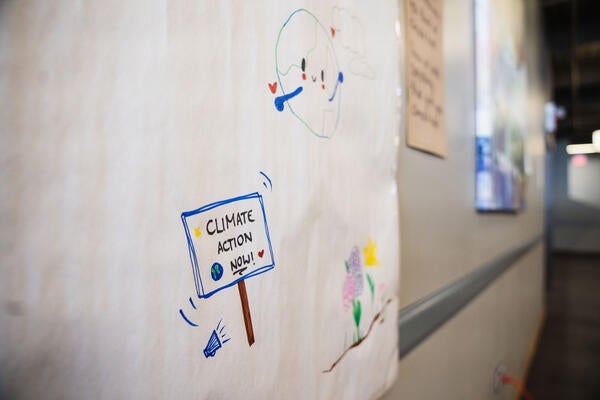
A climate change diploma for every grad student
Waterloo launches first-of-its-kind interdisciplinary graduate diploma in climate change to provide additional resources for the global climate crisis

Waterloo launches first-of-its-kind interdisciplinary graduate diploma in climate change to provide additional resources for the global climate crisis
By Media RelationsUniversity of Waterloo graduate students across all six faculties will soon be able to obtain a new interdisciplinary diploma in climate change to help engage with the complexity of the climate crisis and address potential solutions from a local to global scale.
This diploma – the first of its kind in Canada – will be open to every enrolled masters and doctoral student at Waterloo alongside their primary degree at no additional cost. It will also leverage Waterloo’s innovative approach of collaboration across disciplines from finance to engineering, to health, planning, and earth science to help advance the university’s goal of training the next generation of climate change professionals in Canada.
 “Climate change is everyone’s business,” said Daniel Scott, professor in the Department of Geography and Environmental Management, which is part of Canada’s largest Environment faculty.
“Climate change is everyone’s business,” said Daniel Scott, professor in the Department of Geography and Environmental Management, which is part of Canada’s largest Environment faculty.
"Our faculty has been at the forefront of building programs to fill the climate skills gap, so our students are prepared to thrive in this new reality when they graduate."
To earn the diploma, students are required to take one climate fundamentals course and one approved climate specialization course outside of their home faculty. They must also participate in a minimum of four approved climate change seminars and conferences.
This innovative program was developed by leading scholars and members of the Waterloo Climate Institute, which has one of the largest concentrations of climate change researchers in Canada and spans all six of the university’s faculties.
The diploma joins the Faculty of Environment’s suite of climate-specific training, which includes a climate change course open to all Waterloo undergraduate students, a bachelor of science in climate and environmental change, a professional diploma in climate risk management and a professional masters in climate change, the latter of which is celebrating its tenth anniversary.
Consistent with the institution’s “Waterloo at 100” strategy and vision, the diploma will develop talent for a complex future, advance research for global impact and strengthen sustainable and diverse communities.

Read more
An ambitious research collaboration with Habitat for Humanity is reimagining home ownership across Waterloo Region and Canada

Read more
Researchers awarded funding to investigate ecology, climate change, repatriation, health and well-being through cultural and historical lens

Read more
Waterloo researchers are helping shape the next global scientific assessment that will guide world leaders from climate promises to action
The University of Waterloo acknowledges that much of our work takes place on the traditional territory of the Neutral, Anishinaabeg, and Haudenosaunee peoples. Our main campus is situated on the Haldimand Tract, the land granted to the Six Nations that includes six miles on each side of the Grand River. Our active work toward reconciliation takes place across our campuses through research, learning, teaching, and community building, and is co-ordinated within the Office of Indigenous Relations.